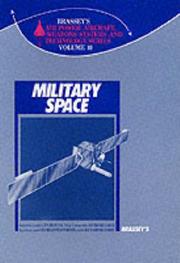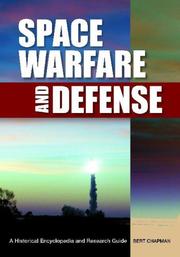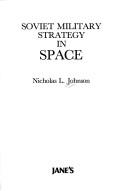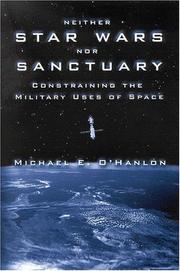| Listing 1 - 10 of 13 | << page >> |
Sort by
|
Book
ISBN: 0241115914 Year: 1986 Publisher: London : Hamilton,
Abstract | Keywords | Export | Availability | Bookmark
 Loading...
Loading...Choose an application
- Reference Manager
- EndNote
- RefWorks (Direct export to RefWorks)

Abstract | Keywords | Export | Availability | Bookmark
 Loading...
Loading...Choose an application
- Reference Manager
- EndNote
- RefWorks (Direct export to RefWorks)

ISBN: 9781598840063 Year: 2008 Publisher: Santa Barbara, CA : ABC-Clio,
Abstract | Keywords | Export | Availability | Bookmark
 Loading...
Loading...Choose an application
- Reference Manager
- EndNote
- RefWorks (Direct export to RefWorks)
Book
ISBN: 0819154768 Year: 1986 Publisher: Lanham, MD : Aspen Strategy Group,
Abstract | Keywords | Export | Availability | Bookmark
 Loading...
Loading...Choose an application
- Reference Manager
- EndNote
- RefWorks (Direct export to RefWorks)
ANTI-SATELLITE WEAPONS --- SPACE WARFARE--USA --- USA--MILITARY POLICY
Book
ISBN: 9781784052003 1784052000 Year: 2016 Publisher: London: ISTE,
Abstract | Keywords | Export | Availability | Bookmark
 Loading...
Loading...Choose an application
- Reference Manager
- EndNote
- RefWorks (Direct export to RefWorks)
La strategie est l'art de penser la guerre avant de la conduire. Constatant qu'il n'y a deja plus de guerre sans l'espace, cet ouvrage etudie l'extension des conflits dans ce nouveau domaine. Il delimite le milieu extra-atmospherique et en presente les specificites et les contraintes. Explorant les possibilites d'action offertes par differentes positions strategiques, il analyse les scenarios plausibles d'un combat depuis, contre et dans l'espace. Il explicite les concepts de militarisation, d'arsenalisation et de martialisation de l'espace et montre comment les systemes spatiaux constituent une composante essentielle de la maitrise de l'information, cle de la puissance au XXIe siecle. L'ouvrage demontre egalement pourquoi nos societes, devenues spatiodependantes, doivent developper leur spatioresilience par des mesures adaptees. Il synthetise enfin son enseignement de facon mnemotechnique a la maniere de douze principes de la strategie spatiale.
Spatial ecology --- Outer space security --- Outer space and civilization --- Space warfare --- Astronautics, Military --- France --- Military policy --- SPACE WARFARE --- ASTRONAUTICS, MILITARY --- STRATEGY --- Astronautics, Military - France --- France - Military policy

ISBN: 0710604491 Year: 1987 Publisher: London : Jane's,
Abstract | Keywords | Export | Availability | Bookmark
 Loading...
Loading...Choose an application
- Reference Manager
- EndNote
- RefWorks (Direct export to RefWorks)
ASTRONAUTICS, MILITARY--USSR --- SPACE WARFARE--USSR --- SPACE WEAPONS--USSR --- ARTIFICIAL SATELLITES, RUSSIAN
Book
ISBN: 0819164216 Year: 1987 Publisher: Lanham, MD : University Press of America,
Abstract | Keywords | Export | Availability | Bookmark
 Loading...
Loading...Choose an application
- Reference Manager
- EndNote
- RefWorks (Direct export to RefWorks)
ANTI-SATELLITE WEAPONS --- SPACE WARFARE--USA --- ARMS CONTROL AND DISARMAMENT --- USA--MILITARY POLICY --- SPACE WEAPONS
Book
ISBN: 9780190903343 Year: 2020 Publisher: Oxford, UK : Oxford University Press,
Abstract | Keywords | Export | Availability | Bookmark
 Loading...
Loading...Choose an application
- Reference Manager
- EndNote
- RefWorks (Direct export to RefWorks)
This book is the first work to assess the full impacts of space expansion, past, present and future. Thinking about space, and the visions fervently promoted by the global space movement, are dominated by geographic misperceptions and utopian illusions. The parts of space where almost all activity has occurred are part of the planet Earth, its astrosphere, and are, in practical terms, smaller than the atmosphere. Contrary to frontier visions, orbital space is already congested and degraded with dangerous space debris. The largest impact of actual space activities is an increased likelihood of catastrophic nuclear war stemming from the use of orbital space and space technology to lob nuclear weapons at intercontinental distances. Building large-scale orbital infrastructures will probably require or produce world government. The ultimate goal of space advocates, the colonization of Mars and asteroids, is promoted to guarantee the survival of humanity if major catastrophes strike Earth. But the spread of humanity into a multi-planet species will likely produce an interstate anarchy highly prone to total war, with Earth having many disadvantages. Altering the orbits of asteroids, a readily achievable technology vital for space colonization, also makes possible 'planetoid bombs' with destructive potentials millions of times great than all nuclear weapons. The biological diversification of humanity into multiple species, anticipated by space advocates, will further stoke interworld wars. Astrocide - the extinction of humanity resulting from significant space expansion - must join the lengthening list of potential threats to human survival. Large-scale space expansion should be relinquished in favour of an Earth-oriented space program of arms control and planetary security.
OUTER SPACE--STRATEGIC ASPECTS --- OUTER SPACE--EXPLORATION --- OUTER SPACE--CIVILIAN USE --- SPACE WARFARE --- GEOPOLITICS
Book
ISBN: 9781474450485 Year: 2020 Publisher: Edinburgh : Edinburgh University Press,
Abstract | Keywords | Export | Availability | Bookmark
 Loading...
Loading...Choose an application
- Reference Manager
- EndNote
- RefWorks (Direct export to RefWorks)
This book presents a theory of spacepower and considers the implications of space technology on strategy and international relations. The spectre of space warfare stalks the major powers as outer space increasingly defines geopolitical and military competition. As satellites have become essential for modern warfare, strategists are asking whether the next major war will begin or be decided in outer space. Only strategic theory can explore the decisiveness and effects of war in space on grand strategy and international relations.

ISBN: 0815764561 081576457X Year: 2004 Publisher: Washington, D.C. Brookings Institution Press
Abstract | Keywords | Export | Availability | Bookmark
 Loading...
Loading...Choose an application
- Reference Manager
- EndNote
- RefWorks (Direct export to RefWorks)
Space has been militarized for over four decades. Should it now be weaponized? This incisive and insightful book argues that it should not. Since the cold war, space has come to harbor many tools of the tactical warfighter. Satellites have long been used to provide strategic communication, early warning of missile launch, and arms control verification. The U.S. armed forces increasingly use space assets to locate and strike targets on the battlefield. To date, though, no country deploys destructive weapons in space, for use against space or Earth targets, and no country possesses ground-based
Polemology --- United States --- Astronautics, Military -- United States. --- Ballistic missile defenses -- United States. --- Space warfare. --- United States -- Military policy. --- World politics -- 21st century. --- Air Forces --- Military & Naval Science --- Law, Politics & Government --- United States of America
| Listing 1 - 10 of 13 | << page >> |
Sort by
|

 Search
Search Feedback
Feedback About UniCat
About UniCat  Help
Help News
News